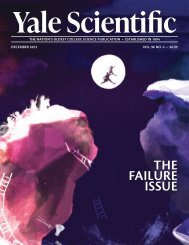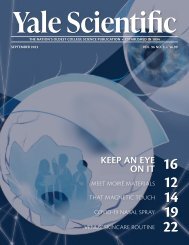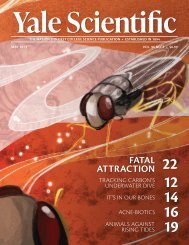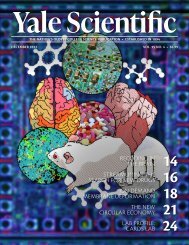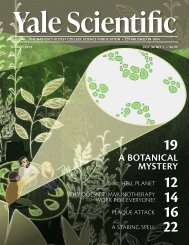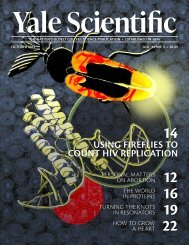YSM Issue 86.3
Create successful ePaper yourself
Turn your PDF publications into a flip-book with our unique Google optimized e-Paper software.
BY ANDREW DEVEAU
ENERGY
Economics Professor Discusses
Overstimation of Energy “Rebound Effect”
ECT
In a piece published in Nature in January, Kenneth
Gillingham, Assistant Professor of Economics at the
Yale School of Forestry & Environmental Studies,
argues that the size of the “rebound effect” — the
bounce in consumption following
a decrease due to improved efficiency
— is often overestimated.
To visualize the rebound effect
at work, suppose American automobile
manufacturers develop
more fuel-efficient cars. Because
each gallon of gas provides more
mileage, gas is relatively cheaper
and people are inclined to drive
more. Second, some of the money
saved on gas will be spent on other energy-consuming
goods. Additionally, improved efficiency might spur
economic growth, which consumes energy. And finally,
if American demand for oil decreases, oil will become
cheaper globally, increasing consumption abroad.
Some argue that these effects are so significant that
any increase in efficiency is sure to backfire, increasing
rather than decreasing energy consumption. This
would mean that “energy efficiency policies would not
cut our energy use at all,” said Professor Gillingham.
However, by examining macroeconomic
data and conducting
studies on consumer responsiveness
to changes in efficiency and
prices, Professor Gillingham has
shown the size of the rebound
effect to be exaggerated. In the
IMAGE COURTESY OF SCRIPPS COLLEGE
Professor Gillingham’s work
combines economics and
environmental science.
developed world, the rebound
effect results in only between a 20
percent and 60 percent reduction
in savings. Gillingham emphasizes,
therefore, that setting efficiency standards could
remain an effective way to confront the problem of
energy consumption. The debate over energy policy
rages on: there has already been a counterargument
to Gillingham’s piece published in the February issue
of Nature.
Professor Handelsman Named One of Nature’s
“Top Ten People who Mattered” in 2012
IMAGE COURTESY OF HOWARD HUGHES MEDICAL INSTITUTE
Professor Handelsman works with a student
investigating bacteriology and plant pathology.
BY ELIZABETH ZHANG
SOCIOLOGY
Jo Handelsman, Frederick Phineas Rose Professor
of Molecular, Cellular, and Developmental Biology,
was recently featured by Nature as one of the “Ten
People Who Mattered” in 2012. The article, “366 Days:
Nature’s 10,” demonstrated the acute international
response to Handelsman’s research in gender bias.
In August 2012, Handelsman and Dr. Corinne
Moss-Racusin, a postdoctoral fellow in psychology,
published in the journal Proceedings of the National
Academy of Sciences their results on gender bias in the
scientific community. Handelsman explains their motivations:
“Scientists would typically say, ‘[gender bias]
doesn’t apply to us, even though it applies to every
other group in society. It doesn’t apply to scientists
because we’re trained to be objective.’ And it made
Corinne and I say, ‘okay, let’s answer the question
with the data.’” In their study, 100 scientists were
given applications from fictitious male and female
undergraduates seeking jobs as laboratory managers.
The results were unequivocal and shocking: Employers,
male and female alike, consistently considered
female applicants less competent, offered them lower
salaries, and were more likely to withhold from them
career-building advice. “I was not surprised by our
findings per se, but by how robust the findings were,”
said Moss-Racusin.
The study has since then gained international recognition,
“even without the help of the Nature feature,”
Handelsman said. The study continues to motivate
her to eliminate bias by holding educational training
sessions for employers. She believes that even modest
efforts in the classroom, such as students bringing up
the study with their professors, can help alleviate the
worst effects of bias.
www.yalescientific.org April 2013 | Yale Scientific Magazine 7





